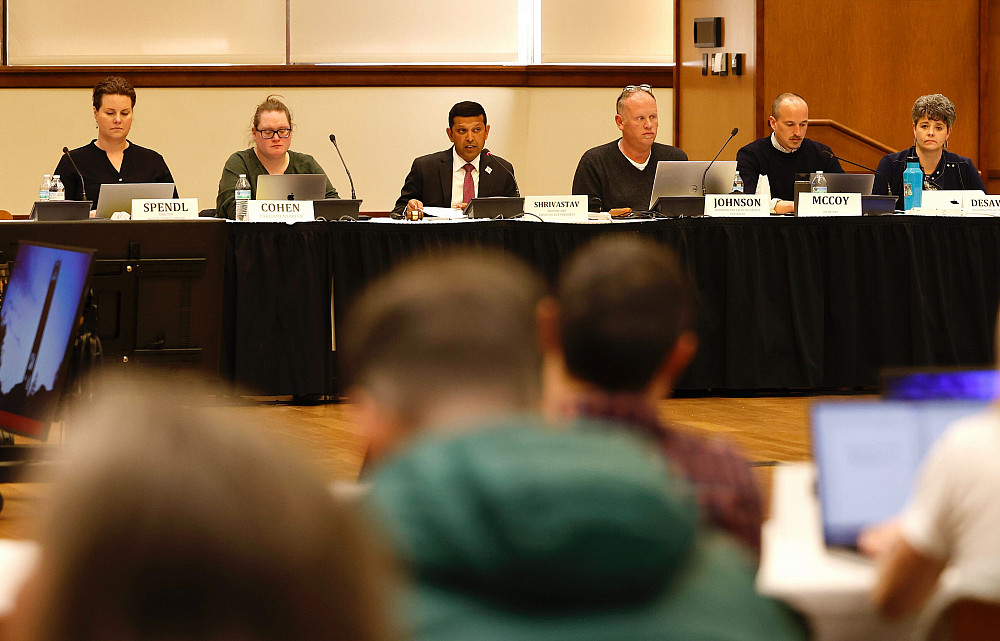Bloomington State of the Campus embraces complexity
By Office of the Provost and Executive Vice President
March 19, 2024
Indiana University Bloomington Provost and Executive Vice President Rahul Shrivastav characterized the campus as “up for the challenge, resilient as ever and resolved to lead boldly” in his State of the Campus address, delivered during the March 19 Bloomington Faculty Council meeting in Presidents Hall.
Shrivastav began his address with a recognition of challenges facing IU Bloomington and higher education more broadly, including declining public confidence in universities, resource constraints, rapidly changing technologies, geopolitical unrest and detrimental legislation.
“I ask you today for the grace to allow me to reframe this current moment we’re in,” Shrivastav said. “Because, for all its messiness, I believe today and tomorrow there are glorious opportunities ahead for Indiana University Bloomington — if we are bold enough and resolved enough to pursue them.”

He signaled that future financial opportunity exists in academic programs with high growth potential, especially graduate, hybrid and online; increased external grant funding; and strong fundraising.
In reference to the emergent budget redesign, Shrivastav emphasized the benefits of shifting from a model that encourages competition between units to one that incentivizes collaboration. He acknowledged the inevitable uncertainty of transition while affirming confidence in the move.
Turning to student expectations, Shrivastav celebrated schools that have developed top-ranked programs and “stand at the forefront of fields of the future,” as well as IU Bloomington’s enduring history of excellence in the arts and humanities.
“The question will never be whether the liberal arts have a central role in the future of IU, but how we support the arts, humanities and sciences in new, more innovative ways,” Shrivastav said. “We need to create common experiences, foster new discoveries and ensure we equip all our students to be critical thinkers, exceptional writers and better human beings. I understand well not every major or program will have hundreds of students, but we’ve been inventing in these fields for hundreds of years, and we must urgently recommit ourselves to doing so.”
He pointed to interdisciplinary examples of the type of work he sees not only sustaining the campus but deepening its impact: collaborative study of toddler and computer vision, involvement in the U.S. AI Safety Institute Consortium and the new seven-school partnership that will result in an expanded-reality KIX Lab.
Linking the faculty, staff and student experiences, Shrivastav underscored the importance of preparing students for an increasingly complex and interconnected world by expanding access for academically motivated individuals of all backgrounds and identities and offering distinctive and holistic support.
He said that 62 new faculty have joined the Bloomington campus through the Presidential Diversity Hiring Initiative in less than three years, and the first cohort of the faculty mentoring program EMPOWER is in progress.
Meanwhile, the semester-to-semester persistence rate is improving across student populations, including underrepresented students of color, Pell Grant recipients, 21st Century Scholars and first-generation students. Additionally, in the latest Indiana College Completion Report, IU Bloomington was recognized by the Indiana Commission for Higher Education for having the highest four-year completion rate for 21st Century Scholars in the state.
On the undergraduate student side, highlights included progress on instructional space renovations, the lowest campuswide D, F and withdrawal rate in at least a decade, high rankings in education abroad, the launch of the Office of Student Life and improvements to honors education.
Shrivastav also previewed changes in advising. In addition to the enhancement of a faculty-initiated early-alert system, he announced a transformation of the current academic advising structure, including required academic advising of all undergraduate students each semester.
“This effort will connect students more readily to their intended majors and ensure advising considers not only what courses are required but how they fit in a student’s life and career path,” Shrivastav said.
He connected these student success initiatives with outcomes achieved in the past year: increasing graduation rates and about 95% of undergraduates finding full-time employment, graduate school and other successful paths soon after graduation.
Focusing on the graduate student experience, Shrivastav touched on dramatic growth of the Graduate School Bloomington’s one-to-one coaching program, an abundance of innovative graduate programs, initiatives like the Preparing Future Faculty Conference, a new ombudsperson to help students resolve challenges and increased stipends for students with assistantships. He encouraged all schools and departments to celebrate graduate students and their successes during the upcoming National Graduate and Professional Student Appreciation Week April 1 to 5.
“Increasing our impact across the state and beyond is a core part of our strategic plan and, to me, the best possible way to counter potential misunderstanding about IU from our state and elected leaders,” Shrivastav said, pivoting toward IU Bloomington’s commitment to service.
He touched on opportunities throughout southern and central Indiana and celebrated the work of the Center for Rural Engagement and its collaborators, as well as IU Innovates, which has blown past its goals to incubate 30 student and faculty startup businesses and launch 25 founder groups. Shrivastav said the campus is looking to double the square footage of the IU Innovates space to align with the hub’s growth.
In the realm of research, Shrivastav noted progress on strategic hiring and research space renovations, including in association with the Faculty 100 initiative. He also celebrated the now fully staffed pre-award services team, exploration of opportunities for large grants in the IUB 2030 transformational research areas of aging and the environment and a soon-to-come research incentive plan.
In closing his address, Shrivastav expressed gratitude for new and incoming leaders and acknowledged the challenge of honoring and cherishing historic practices while embracing new ways of doing.
“I truly welcome all ideas and collaboration on how we create a stronger learning community and support each other more fully in the process,” Shrivastav said. “While the path ahead will not be easy, and may get more difficult before it’s light, we each have a critical role to play — and I am assured that we will.”